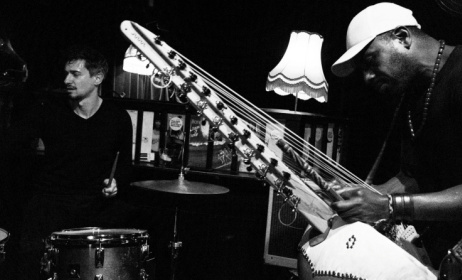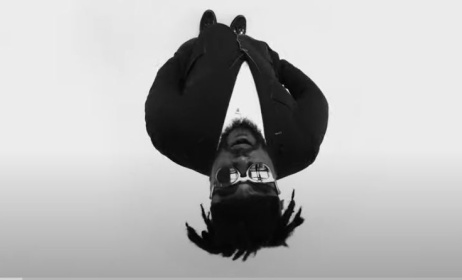Flavour – Ijele the Traveler
Near the end of Flavour’s new album Ijele – the Traveler, the Enugu-raised artist manages to combine flesh and faith on a single song.
 Cover art for Flavour's Ijele - the Traveller
Cover art for Flavour's Ijele - the Traveller
The album's penultimate track, Ukwu Nwata, is a call to come see the booty of his beloved. But the accompanying production—delicate strings, sleepy drums—might inspire a wave of hands as though you are in church. The non-Igbo speaking listener, in fact, might believe she is listening to some worship tune. And who is to say she’s wrong? For more than half his career, Flavour has been on his knees, a series of women before him: Woman worship is the theme of the man’s lyrical career.
So you are better off ignoring him when immediately after that song he lists an activity for each day of the week on the God-focused Most High, and concludes with: “If you ask what me what my best day is/is when I praise you on a Sunday morning.” Yeah right. The song, however, features Semah G. Weifur, a blind child whose clear vocals has to be the album’s sole sound of purity—in both meanings of the word.
If it is possible to speak of a theme for Flavour’s sound, then it would have to be nostalgia: the man is a believer in ancient Igbo highlife. Through his music, Igbo highlife has come to today's young and urbane.
Unfortunately both themes of his music are sometimes in conflict. Ukwu Nwata, for instance, harks back to Flavour's own Iwe, a 2011 tribute to the late MC Loph, which itself harks back to 1972's Uba Awuu Nwa, a song from Peacocks Guitar Band, the popular southern Nigeria group founded by Raphael Amarabem, a Rex Lawson associate. (Flavour sampled Rex Lawson's Sawale on Nwa Baby.)
Where Peacocks’ lead singer asked for people to come witness his sorrow at a man’s death, Flavour calls his people to come stare at a woman’s backside. That his version of Igbo highlife is serving an evangelical purpose is one reason Flavour escapes an accusation of cheapening the music of his ancestors. Another reason is highlife is hardly moral music. Flavour is aware: skits on his albums feature conversations between inebriated men at a beer parlour.
Ijele is not just Flavour hightailing through his genre’s past; he is treading his own past. Five albums in and with alterations here and there, the new project is a kind of greatest hits collection. Flavour has slipped to formula. Baby na Yoka is a repeat of Nwa Baby; Jaiye is an inferior version of Thankful’s Wake Up. Virtuous Woman is an English harmonisation of Golibe/Ada Ada from Thankful/Blessed. Iheneme seeks to recapture the chemistry Flavour shared with Chidinma on Thankful’s Ololufe.
As said, Ukwu Nwata recalls Iwe, but also reuses elements from the DJ Jimmy Jatt/Flavour single Turn Up. Strangely, the wonderful Gbo Gan Gbom, also released last year and featuring Phyno and Zoro, doesn’t make an appearance. In its place, there is Ijele featuring Zoro, also based on the ogene sound but not quite as infectious as Gbo Gan Gbom. Given these, I expected a version of Wiser, the excellent R&B and rap song with Phyno and MI Abaga on Thankful. No such luck. Perhaps the song was deemed unpopular and too modern to return to. Phyno does shows up ‘Loose Guard’, an outstanding pop song with hit potential.
Most of the other songs see Flavour working today’s trends. Body Calling features a terribly underused Terry Apala on a trap beat; the obligatory Ghanaian sound-inflected tune comes up with Sake of Luv, a love song with some gorgeous guitar licks and the most generous of toasting gestures in the adlibs—“I go buy yacht for your sake. What if I build mansion for your sake?” With less verve than usual, Sarkodie volunteers a verse. The song is a highlight.
All this means Flavour’s Ijele - the Traveler is an unoriginal trip. It is, however, not boring. Even when the sounds are familiar, they are not tired. Not yet.
Like some of his pop contemporaries, Flavour can convert nonsense, half-sense, songs-recycled-in-a-sense to hit music. But for an artist as talented and as already successful as Flavour, the resort to formula on this scale teeters close to failure of the imagination. If they could hear him, his ancestors might hope for true reverence. The rest of us, even as we dance, can only hope for freshness.
Buy Ijele - the Traveler on iTunes






























Comments